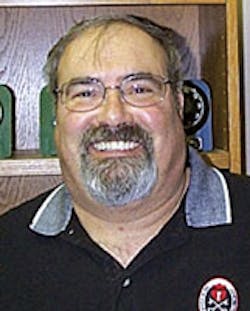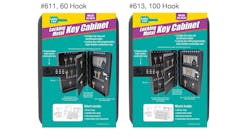Bob Mock seems to be some kind of icon around here. What do you say to that?
I started out over 30 years ago. My degrees are in landscape design and horticulture. It was getting really long in the tooth. I was working seven days a week managing a multi-million dollar retail outfit and my wife was getting antsy about the fact that she never saw me.
So how did locksmithing enter into the picture?
My dad was a locksmith and a Philadelphia fireman. Back 35 or 40 years ago, the alter ego for many firemen and policemen was locksmithing or painting. They both required the use of ladders so maybe that had something to do with it.
How involved was your dad?
He was actually the sergeant at arms for GPLA (Greater Philadelphia Locksmith Association) back around 1970. He asked if I would come help him and being good with my hands I would occasionally help putting in locks and he started to teach me. Back then I wasn’t allowed to use power tools and I did everything with a brace and bit until he trusted me enough. Back then locksmiths were a little fussier about how they left a job. They actually cleaned up! I knew guys back then that would go back and do touch-up painting.
You don’t see that much anymore?
No you don’t, not at the cost of labor per hour. So after awhile of working with him I became really interested in it. All of a sudden I had a revelation that this is an industry that doesn’t stop.
What does that mean?
I had buddies in other trades like plumbing and it’s been the same for the last 100 years. The big new thing in plumbing was plastic pipe. They were still bringing pieces of pipe together to bring in water and bring waste away. With locksmithing, there was always something new going on and what I call the Houdini factor was a biggie back then. I told my dad that I wanted to learn more and he wasn’t interested in anything other than being a one-man show out of his truck.
So what did you do from there?
He said he’d ask at a meeting if anyone needed any help. I had three guys interested. On the first interview I told owner I wanted to be an apprentice and would guarantee him five years and not run off and start my own business. I told him that I wanted him to teach me everything. I didn’t even talk to the other two. I wanted the top spot and couldn’t have it at the other shops anyway.
So the top spot was important to you?
Always. I’m the kind of guy who thinks I’m the manager while I’m sweeping floors. There’s a saying I heard once that said, “The view is the same unless you’re the lead dog,” and I always shot for that.
How’d the apprenticeship go?
I wound up being there for 26 years. For a long time it was a very affable arrangement because I was able to pursue association work, which takes time.
When did you become involved with locksmith associations?
When I first joined GPLA, you had to be a member for two or three years in order to become a full member. My plaque still says apprentice member. I became a full member in 1979 and six months after that I became corresponding secretary. Since then it didn’t stop. Until this year I’ve been on the GPLA board every year. With being president of ALOA, it’s too much.
You served as president of GPLA for eight or so years. Did you have many changes in mind during this time?
Back in the day this was a pretty closed organization. You would hear people make comments about GPLA being a bunch of snobs. My opinion was that if a guy was in the business, then he had something to offer. My dad had special dispensation from the association because you used to have had a store to be a member. If you go to a place like Tennessee today, you’ll find that about 80 percent of the locksmith businesses are mobile ones. In essence it was a business association and not really a locksmith association.
What did you want to see?
I wanted to draw everybody in and be able to use his or her talents. We have guys on the board and still do who weren’t always actual locksmiths. I wanted to be able to use the intelligence of anyone who could assist in bettering my industry. Currently with ALOA, we have people with particular expertise like political experience for example.
It’s been my opinion that we as an industry don’t do enough to promote the industry in general. The public just doesn’t know enough about what we can do for them. What role could ALOA play in making a difference here?
ALOA could create marketing promotions and make them available to chapters and affiliate associations, and then they could present them to their segment of the country. We can now more effectively promote the employment of our ALOA members to various industries and government agencies, because we now require the members to have a certain level of certification, continuing education, along with background checks performed on new applicants. We can state with confidence---these are the reasons why an end-user can be assured that an ALOA member can provide professional services.
A recent letter to ALOA members regarding certification angered some folks I’ve spoken with. What’s the deal with the letter and this subject in general?
The letter was meant to clarify the new by-law changes that took effect on Jan. 1, 2006, by explaining to each member how those changes affected each individual.
Are member locksmiths required to continue their education?
We put the issue of continuing education to a vote by the general ALOA membership and it was approved by more than 75 percent of those who voted. Unfortunately, only a small minority of members vote and therefore the opinions of most members are not heard.
So will locksmiths be required to take all of their continuing education through ALOA?
No. They can participate in courses given by associations, manufacturers, suppliers, trade shows, etc. ALOA does not care if there was a fee to take the class or not. Any fees ALOA does ask for are ultimately put to use for the betterment of our industry. We are trying to make it so that an ALOA membership and certification will help the locksmith be recognized as a certified professional. In states such as New Jersey, continuing education is now required and this will eventually be the case all over.
Do you still teach basic locksmithing?
Yes. This is actually why I went back and got my certification to teach in public schools. I wanted to teach a beginning course. In New Jersey now you have to be an apprentice and pass a test. I saw the need for teaching security and first considered high schools. I went to local vocational schools and I realized it would be difficult to pick and choose my students. Many of them would be juveniles whose records I couldn’t access for the sake of screening out potential criminals. Then I considered maybe teaching an evening course for community colleges. The result was that I got my certificate and went back to teach high school and I love it.
What is your course curriculum like?
I teach them where to go to get more education and teach them what they’ll need to know about. I encourage them to focus on a specific segment of locksmithing. When I started out, you could be a general practitioner. Today I wouldn’t even say I work on automotive because it’s been so long and it’s moved too far away from me. I did mostly electronics and access control. The world of door locks has pretty much stayed the same. Masterkeying and the actual physical key are becoming obsolete. Why use it when I can have a transponder that enables me to control things with a laptop even when flying in an airplane? For example, I am a GM of a company and I am able to go on my laptop to control the entrance of any individual to any area in my plant.
What other areas of interest are there for the up and coming locksmiths?
Forensics is a very big thing these days. We have TV shows that have glamorized it and lots of young people have gravitated towards it. The industry still needs forensic locksmiths since there are insurance companies, for example, that are begging for them. It’s quite fascinating. Again, we’re getting away from actual physical locksmithing. This is the most important tool we have nowadays. (Bob points to his head). It used to be that you had to be skilled with your hands, a craftsman. Today you have to have a lot more up top. Things change too fast and our tools do the work for us.
When I started out, I used a hand-crank key machine and you had to have coordination to cut the key. Today you can put the blank in and it doesn’t matter if you have eyesight or not. Put the key in, turn on the machine and not only does it copy the key, but also it makes corrections for accuracy.
In the 15 years you’ve been teaching locksmithing classes, what have you observed in terms of the students and what they want to learn?
The students are getting younger, which has been a concern of ours for a while. In general, this industry was a second interest for many and that’s why we grandfathered in so many people in ALOA. The old folks like me are sitting on association boards and aren’t appealing to the young people to come on over. In order to insure the future of our industry, we need to include the young people.
For a long time locksmiths were looked at as tinkerers that made their money with lawn mowers or bicycles, true?
Absolutely! You can’t just pick up and be a locksmith today like you could 30 years ago. Back then you could buy a key machine and blanks, a few tools and then go make some money. Today you could spend as much on some items that equal the cost of a small car. It’s changed how the businesses will be manned. You used to have many one-man shops. Today you have professional technicians who move from business to business as the money dictates.
How can smaller shops compete against these larger, professional looking security businesses?
They also have to compete against big box stores. They put a big nail in the coffin as far as retail. I see ads for locks that I couldn’t come near if I were getting a 50/25 discount. At that point you have to stop banging your head against the wall and figure out, "What can I do that they can’t do?" They’re going to be one step behind us but some manufacturers are trying to create stores that will supplant the small locksmith shop.
What do you think about such manufacturers?
Most of what I know is hearsay but it would have to be common business practice. You look at where the money is being made and try to control that area of business. Let’s take the automotive industry. It used to be that you’d sell cars and make money doing it. Now a U.S. car manufacturer competes against foreign manufacturers selling a product that looks just like his product for a lot less money. He’s got to do something to make up for his shortfall. He can fire so many people and close so many plants before he doesn’t exist any longer. So now he’s doing maintenance on a regular basis. You used to see a gas station/garage on every street corner and now they’re gone. The same thing is happening with locksmiths when it comes to automotive. When I started, a Curtis #14 clipper was high tech. Today that’s a joke and the automotive companies are taking that segment of the industry back.
What’s another example of this happening in our industry?
Many locks are now made in China. The Koreans are upset because they’re losing market share. It’s so far beyond us as far as the manufacturing goes. U.S. automakers are buying parts from India because they are the cheapest at the moment. So you have think globally and keep your ears and eyes open to what’s going on all over the world because people aren’t going tell you how to compete with them.
What’s ALOA doing to help with this scenario?
We have international contacts and even have an international director on the board of ALOA for this reason. It all comes back to what I was saying earlier about ALOA’s role in our industry. When I retire I want to see our industry intact and thriving. Prior to licensing, locksmiths were on their way out in my opinion.
Where do you think the locksmith industry would be if ALOA suddenly disappeared?
There would be a void. I think potentially, that void will be felt in the future more than in the past. Today, with legislation happening so quickly, we need to be there for everyone that faces this challenge. Oklahoma is currently going through it and we’ve been able to help them. They are riding on the coat tails of the alarm industry and we have to go there because they want to cut a chunk of our business out. If we weren’t there, I don’t know whom else they would go to.
So you think ALOA’s role is more important now than it was 30 years ago?
It’s always been important to have a central focal point and whether or not the association was that is another story. I think most of the movers and shakers realize that we need this central focal point to help move us in the right direction
If you were starting a locksmith business now, how would you go about it? Would you hire apprentices?
If I had skills and wanted to do the work, then I might. If I just wanted to make money, I would hire talent. When we got into access control, the hardest thing for us to do was to subcontract. Our attitude was that we were able to do it ourselves and save five dollars. Some things just don’t pay to do by yourself. A local business owner I know spends most of his time networking and spending time in the right places. He doesn’t have to be able to install a lock in ten minutes; he hires someone to do it. We have to have bigger shops that can hire skilled people.





